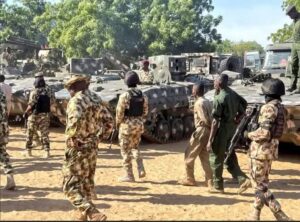
Despite the Federal Government’s deployment of more military artillery to the North-West and North-Central regions, the worsening banditry situation casts doubt on the ability of the President, governors and the armed forces to tackle the menace, OLALEYE ALUKO reports
On June 1, the Defence Headquarters, Abuja, worried by the festering banditry situation, decided to begin a military onslaught tagged Operation Accord, in the North-West and North-Central regions of the country.
The operation, the military said, was aimed at bombing targeted bandits’ camps and locations across about nine states in the regions – Katsina, Zamfara, Sokoto, Kaduna, Niger, Kebbi, Kano, Nasarawa and Benue.
Barely a week after the operation, June 9 specifically, 18 persons were killed by bandits in fresh attacks on five communities in the Faskari Local Government Area of Katsina State. The bandits slaughtered the inhabitants across Kadisau, Kabalawa, Kwakware, Unwuwar, Wahabi and Raudama areas.
Apart from Katsina being the hometown of the President, Major General Muhammadu Buhari (retd.), it was where the Defence Headquarters in the first week of May stated that troops attached to Operation Hadarin Daji killed no fewer than 146 bandits during clearance operations.
Also on May 24, the DHQ said ‘over 200 bandits were killed in multiple air strikes conducted on camps in Katsina and Zamfara states’ in its Operation Hadarin Daji in the North-West region.
The DHQ noted that the bandits were targeted and killed in Ibrahim Mai’Bai’s Camp in the Jibia Local Government Area of Katsina State and Kurmin Kura in Zurmi Local Government Area of Zamfara State.
How the bandits managed to regroup and strike North-West communities continually should be a source of worry to the military if it was headed by efficient service chiefs, an elder statesman and Second Republic lawmaker, Dr Junaid Muhammed, said in an interview with Saturday PUNCH.
Muhammed said, “In the first place, the soldiers are simply not available. The number of soldiers we have on the ground in the North-West is simply not enough to control this menace. Secondly, the government has proved itself to be totally inept in the way it manages even the politics of the military.
“I cannot see any reason why and how the Chief of the Army Staff, Lt. Gen. Tukur Buratai, remains in office and has had the kind of extension he enjoys. This has run against every norm about managing the military system, and there is nothing in his performance that justifies his being retained.”
The elder statesman added that banditry in the North-West and North-Central regions was also due to negligence and poor performance by the concerned state governors and local government chairmen in the two regions.
Muhammed explained, “In my modest understanding of the situation, the root causes of both the Boko Haram terrorists and the bandits are similar in nature. The root causes must be the fact that the governments of the past and the government of the day, particularly for banditry, must be overwhelmingly held responsible.
“There is a governance issue. When you don’t care about the welfare of your people and you believe that telling lies is the order of the day, you would have this situation. The fact remains that those areas that are suffering from insecurity are either under-governed or badly governed.
“The schools and other public institutions are not run properly, if they are there at all. Almajiri, they call them, fester and the standard of living is very low. These children are growing up without any western education, meaningful skills or vocations, so you see that there is a problem.
“The Nigerian political elites have a responsibility to sit down and be honest with ourselves and look eyeball to eyeball. We have to come to a security consensus which must be enforced by those in power or those in the ruling party. They have a responsibility to bring good judgment to those places.”
The worsening banditry has also begun to draw protests from aggrieved residents, confirming some security experts’ position that a political solution is needed to quell the ballooning insecurity.
Many residents believed that their state governors were not doing enough to stop the banditry and had also neglected key socio-economic infrastructural developments which would discourage banditry.
Recently, some protesters in Yantumaki town in the Damusa Local Government Area of Katsina State burnt down a campaign billboard of the All Progressives Congress with the pictures of the President, Major Gen Muhammadu Buhari (retd.) and the state governor, Aminu Masari.
The billboard was burnt along the highway leading to the town, in clear demonstration against the activities of the bandits, including the killing of 18 persons in the state on same Tuesday.
The protesters bemoaned the level of insecurity in Yantumaki town and neighbouring communities, including kidnapping and killings.
A case in sight by the protesters was the kidnap of a health worker, Alhaji Mansir Yusuf, and his daughter by bandits the previous day. On the same day, the bandits stormed the palace of the district head of Yantumaki, Atiku Maidabino, and killed him.
A former Director of the Department of State Services, Mike Ejiofor, said the state governments should look into unemployment, illiteracy and lack of education which were among other factors responsible for the persistent banditry crisis in the North-West.
He said, “Those are contributory factors to the insecurity. There is so much hunger in these states and the residents have to survive. Sometimes, the bandits tend to visit the communities in frustration, create panic, loot and kill. It is not only about the security architecture. The state governments have to be more responsible.”
Ejiofor noted that based on repeated calls by many concerned Nigerians, the military leadership needed to be rejigged.
He said, “You don’t know what to believe. Each time the military comes to tell us its troops have killed hundreds and thousands of bandits; you begin to wonder how many they are in the terrorist group. So it is either someone is playing politics or they are not telling us the truth. Also, take it or leave it, our military is not adequately equipped to fight this insecurity.
“I believe that we have to set our priorities right; we have to give more funds to the military. We have to re-engineer the security architecture because if you stay too long in a place, you begin to lose ideas. Nigerians are tired and have asked for a change of service chiefs and there has been no response. I believe it is high time the government heeded that call.”
A former Commissioner of Police, Lawrence Alobi, said the military and other security agencies needed to be well funded and that the state governments must play a major role.
Alobi said, “When the banditry and killings resumed, I did not think that the government gave it the attention it deserved. It has now snowballed into an overwhelming problem for the state governments. Security agencies have been underfunded all along and this is also one of the results of such long years of neglect.
“The police don’t have the manpower and equipment to arrest banditry. The citizens look up to the government and when nothing is coming forth from the government, there is an issue.
“Unemployment, poverty, corruption and bad governance are contributory factors to banditry. The state governments have to focus on poverty eradication strategies because these are tied to reduction of criminal activities.”
Notwithstanding analysts’ views, the military have continued to reel out figures of alleged decimated bandits in the North-West and North-Central regions, although the figures have been subjects of debate among many Nigerians.
The DHQ Defence Media Operations, Abuja, said the latest troops’ onslaught tagged Operation Accord had led to the killing of 392 bandits in the first week. Regrettably, on the second week, there was an attack and killing of 18 residents.
The DMO Coordinator, Maj Gen John Enenche, hinted that the military believed that the bandits had also resorted to reprisals on civilian targets.
“In the North-West and North-Central parts of the country, troops through land and air offensives have neutralised 392 bandits and other criminal elements in the two zones. Consequently, those bandits that escaped resorted to reprisals on civilian targets.
“Operation Accord was therefore planned by the high command of the Armed Forces of Nigeria to handle this situation. In this regard, the Chief of Defence Staff ordered the commencement of Operation Accord from June 1. This is a joint operation involving the military and other security agencies,” Enenche said.
As early as February 2020, the banditry situation in the North-West had worsened, beginning with early attacks on Birnin Magaji and Zurmi Local Government Areas of Zamfara State and Kaita Local Government Area of Katsina State.
The rising insecurity forced the Nigerian military authorities to therefore shelve its planned withdrawal of troops in some parts of the country in the first quarter of 2020.
The military echelon in February while considering the brewing banditry crisis drew the curtain on its earlier plan in December 2019 to withdraw troops from the North-West.
More troops were thereafter deployed to the communities but the banditry did not in any way abate.
On February 8, bandits’ enclaves were discovered in five local government areas of Zamfara State, with stockpile of weapons.
The bandits’ strongholds were found to be in Anka, Talata Mafara, Tsafe, Maru and Bukkuyum Local Government Areas of Zamfara State.
On March 15, the bandits were bold enough to engage the army in a gun duel, in the Kebe and Bodinga areas of Sokoto State and the Igabi area of Kaduna State, during which at least 11 bandits were shot dead.
The troops of 1 and 8 Divisions, attached to Operation Mesa, conducted the operations, during which two suspected bandits – Sule Sale and Umar Alhaji – were arrested.
From February till date, continuous military onslaughts have forced the bandits to migrate across states, invading the North-Central region, thereby escalating the insecurity. The bandits are now spread across Kaduna, Niger and parts of Benue State, according to reports.
On June 6, the military conducted air offensives under Operation Thunder Strike and Operation Accord killing more than 70 terrorists in Kachia Forest in Kaduna State.
A political analyst and President of Campaign for Democracy, Usman Abdul, believes that state governments are to be largely held responsible as he berated them for not utilising the security vote they collect.
Abdul said, “It is rather unfortunate and uncalled for – the banditry situation that we now find ourselves in. This is when state governors who are supposed to be the custodians of security are playing politics with human lives. With the huge security votes they get, it has become business as usual. There is no accountability to the people.
“On the problem of banditry, it is said that some helicopters were seen dropping ammunitions for bandits in the remote areas. Who are the people who can afford choppers if not the elites? This is just obvious. The political class needs to be more sincere with the governed.
“Another way out of this menace is to intensify community policing and involve traditional institutions.”
As with the ineptitude of state governments as stated by analysts, the Nigerian Army last week also confessed that it had “great concern about the banditry incidents in some parts of the North-western part of the country across Katsina, Sokoto and Zamfara states.”
The military said the bandits were shifting base and “venting their anger on hapless citizens because of the ongoing operations in Katsina State.”
The acting Director, Army Public Relations, Col Sagir Musa, said, “We sympathise with fellow Nigerians and the people of Katsina, Sokoto and Zamfara states in particular, on these unfortunate incidents, we would like to assure all of our unrelenting effort in engaging with communities to rid our society of any and all remnants of these criminal elements.
“We would like to state further that the Nigerian Army in conjunction with Nigerian Air Force, sister service, other security agencies and the affected states governments, will make efforts to clear all known bandits hideouts in those states as more troops are being mobilised as directed by Mr President and Commander-in-Chief of the Armed Forces.
“We would also like to give an assurance that these heinous crimes will not go unpunished and will not be allowed anywhere in our country. We would ensure that appropriate action is taken to mitigate any future incidents. We implore Nigerians to continue to cooperate with the troops as they carry out their duties.”
Aside from rhetorics, Nigerians are yearning for a safe nation. President Buhari, state governors and security chiefs will have to walk their talk in order to give some semblance of hope to disillusioned Nigerians.












